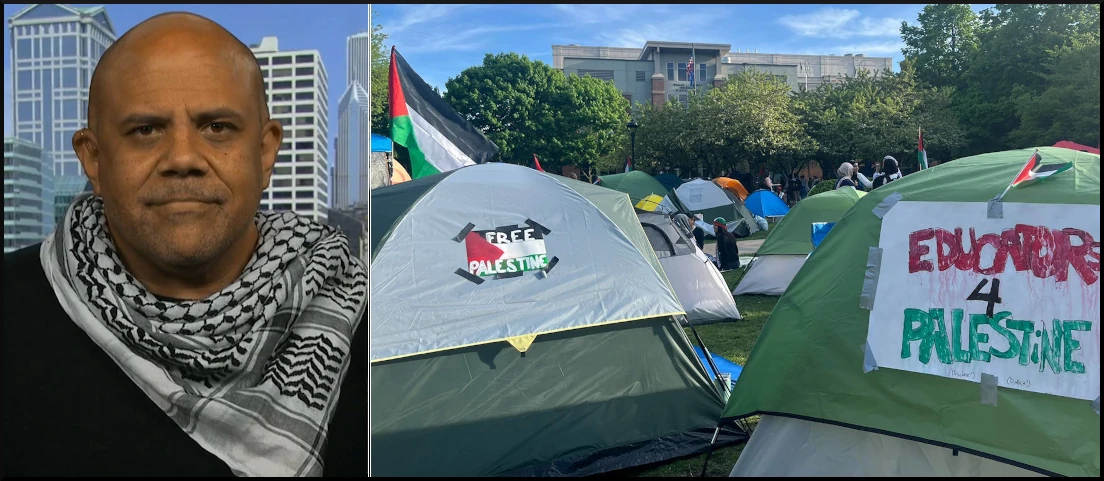by Dr. Karlos Bermann, published on Socialist Action, September 26, 2024
Editor’s Note: Here are more ideas on protesting in the US and ending the US/Israeli war on the Middle East.
With Fall Semester beginning, it’s time to turn the tables on campus repression and censorship!
Classes are just resuming and in Virginia we’ve already seen VCU students campaigning against repression, based on what occurred at Palestine last April. We’re likely to see more of the same when protest actions begin again. That’s especially true at state schools like VCU where Gov. Glenn Youngkin, who gave the commencement address in May, wants to get involved and show what a tough guy and friend of Israel he is.
Now Northwestern University, a private school just outside Chicago, has suspended Steven Thrasher, a journalism professor, for being present (as a journalist) in a student protest encampment—a perfect test case for freedom of expression.
But wherever the Palestine solidarity movement meets with attempts at repression, especially on campus, we must take the offensive. That means making free speech and assembly the immediate issue. Now, with election season in high gear, we’ll be bombarded with all kinds of BS about democracy. We should jump right in and say, “You want to talk about democracy? How about our right to free speech and assembly?” We can show them up for the hypocrites they are.
Meanwhile, do we drop agitation against US sponsorship of genocide, of complicity with war crimes? Not at all. Taking the offensive against repression will give us new opportunities to spread the word about Palestine. Many people will support free speech and assembly who for one or another reason haven’t been ready to take action on Palestine. We shouldn’t underestimate the effects of “manufacturing consent” on the US population—there are billion- and trillion dollar industries that do nothing 24/7 but crank out garbage to befuddle their minds. Remember, most people aren’t tuned in to Al-Jazeera and The Electronic Intifada like we are, but they can be won over.
So how do we go on the offensive? Simple. We start with the same types of actions we have been organizing already: teach-ins, picket lines, marches, and rallies. Only difference is we center these, in terms of publicity and demands, on our rights to free speech and assembly.
The genius of the teach-in is that it brings the protest movement into the classroom so to speak. It was devised at the University of Michigan Ann Arbor in 1965 to circumvent attempted repression. Some faculty members wanted to call a strike against the Vietnam War, but the administration threatened to fire any faculty who went on strike. So they came up with the idea of adapting the “sit-in” tactics of the Civil Rights movement to the university as a “teach-in.” The rest, as they say, is history.
When it comes to colleges, universities, and other educational institutions, with their crap about disrupting classes and outside agitators, we’ve got plenty to hit back at them with. Google “The role of educational institutions in society” or something similar. You’ll get back responses like these two snippets from an actual search:
“Educational institutions play a crucial role in shaping society by not only providing formal education but also by instilling moral values, promoting peace, and fostering tolerance and harmony.”
“They are essential social systems that contribute to individual development and societal progress, influencing the cultural and economic aspects of communities.”
There’s plenty of food for thought and discussion there. All the responses, whatever the point of view, affirmed the important social role of educational institutions. None defended the idea that they are “ivory towers” isolated and insulated from the issues and problems affecting society. An important social/societal role, no matter how one defines it, not only implies, but assumes engagement in and with society. To have a role in society—a democratic society—educational institutions must interact with the demos—the common people—and the people must interact with them.
It’s natural for students to be concerned about the important issues of the day. Education, if it’s worth anything, is exposing them to important ethical and moral questions. What greater moral/ethical question can there be than whether one’s tax dollars or college tuition is funding war crimes and genocide? Students are going to be the first to ask, “Why should we care about the Holocaust that happened to white (or almost white) Europeans 85 years ago, but not about the Holocaust that is happening to people of color in Palestine today?”
The same considerations apply when college/university administrations, or others, try to muzzle us on the spurious grounds of “anti-Semitism.” “What is Anti-Semitism?” would make a great teach-in topic. Of necessity it would certainly uncover the fact that Palestinians, including indigenous Jews and most of the other peoples of the Mideast are all Semitic peoples! How, therefore, can being for the Palestinians and against the state of Israel be considered anti-Semitic? That would also make those (like the Zionists) who hate Palestinians into anti-Semites.
So, back to school and facing or anticipating cop repression of your right to free assembly or muzzling your free speech? Talk this up with your friends and classmates, and especially with professors who aren’t afraid to take a stand. I’ll bet you can find at least one who’ll see the possibilities for a good teach-in. And that should get the ball rolling.
And one last thing: Never forget that, until we are victorious, we cannot stop educating, convincing, and recruiting new converts to our cause.
*Featured Image: Steven Thrasher, Encampment at Northwestern University. Src: Democracy Now!
